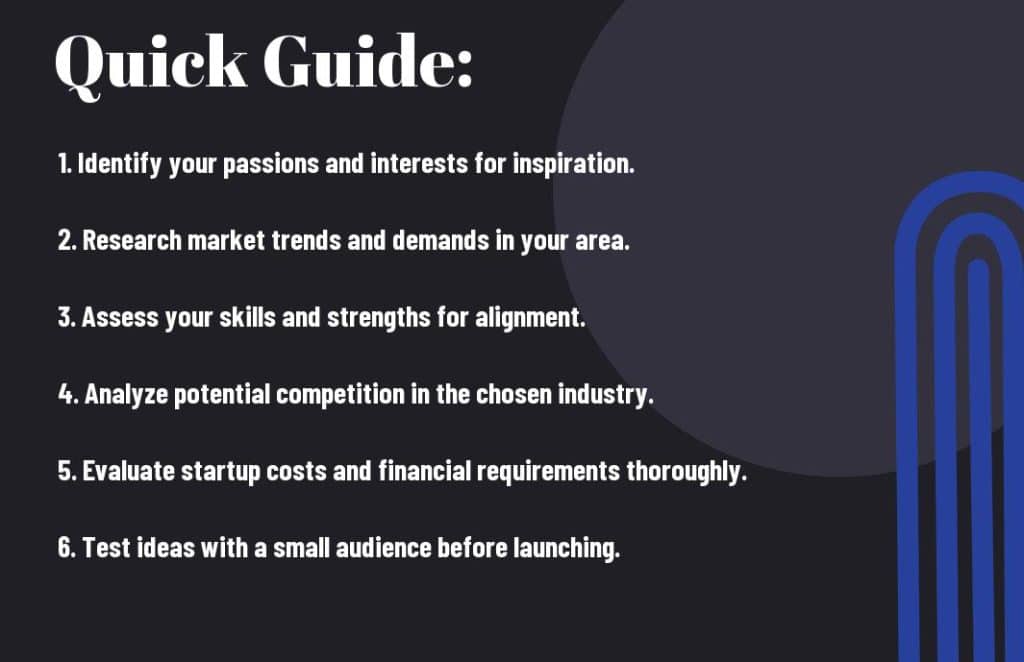What type of business should I start?
Entrepreneurship offers a wide array of opportunities, and determining what type of business you should start is a pivotal step in your journey. With countless industries to explore, you need to assess your interests, skills, and market demand to find the perfect fit. This guide will help you evaluate your options and provide insights on how to align your passions with profitable avenues, ensuring your entrepreneurial venture is both satisfying and successful.
Key Takeaways:
- Passion and Interest: Choose a business that aligns with your personal interests and passions to ensure sustained motivation.
- Market Research: Conduct thorough market research to identify gaps in the market and understand your target audience’s needs.
- Scalability: Consider the potential for growth; select a business model that allows for scalability and adaptability over time.

Understanding Different Types of Businesses
A variety of business models exist, each catering to unique market needs. To determine which type suits you, consider the following categories:
- Service-Based Businesses
- Product-Based Businesses
- Online Businesses
- Brick-and-Mortar Businesses
- Hybrid Models
Perceiving the differences among these models can guide your decision-making process.
| Type of Business | Description |
| Service-Based | Offers services rather than products. |
| Product-Based | Sells physical goods to customers. |
| Online | Operates primarily through digital channels. |
| Brick-and-Mortar | Has a physical storefront for customers. |
| Hybrid | Combines online and physical operations. |
Service-Based Businesses
Now, service-based businesses encompass a range of industries, from consulting to personal training. They prioritize delivering expertise and skills directly to clients, creating value through human interaction and customized solutions.
Product-Based Businesses
You may choose to venture into product-based businesses, which focus on selling tangible goods to consumers. This type often involves intricate supply chains, inventory management, and effective marketing strategies to attract buyers.
It is vital to understand that product-based businesses require strong inventory control and customer service to thrive. By developing your product and branding effectively, you can create a loyal customer base and drive sales, making the investment of time and resources worthwhile.
Online vs. Brick-and-Mortar
Different types of businesses operate in various environments, specifically online or brick-and-mortar settings. Each has its strengths, requiring distinct strategies to succeed.
Understanding the nuances between online and brick-and-mortar businesses helps you tailor your approach. Online businesses offer flexibility and reach a wider audience, while brick-and-mortar establishments can foster community engagement and immediacy, influencing how you connect with your customers.
Key Factors to Consider Before Starting
It’s necessary to evaluate several key factors before launching your business. Consider aspects such as market demand, financial resources, and your personal skills and interests. These elements can significantly influence your success. Take note of the following:
- Market Demand
- Financial Resources
- Personal Skills and Interests
Knowing these factors will help you make more informed decisions about the type of business you choose to pursue.
Market Demand
An analysis of market demand is vital for determining whether your business idea will be viable. Understanding the needs and preferences of your target audience allows you to tailor your products or services to fill gaps in the market.
Financial Resources
For any business endeavor, adequate financial resources are necessary for both initial setup and ongoing operations. Assess how much capital you can invest and whether you need to seek external funding or apply for loans.
Consider developing a detailed budget and financial plan that outlines your startup costs and projected revenue. This will provide a clearer picture of the financial commitments involved and help you secure necessary funding if needed.
Personal Skills and Interests
Financial success often aligns with your passion and expertise. Assessing your personal skills and interests can lead to identifying a business idea that you are not only good at but also enjoy.
Personal passion can be a significant driving force in overcoming challenges that arise during your entrepreneurial journey. When you align your business with your interests, you’ll likely remain motivated and dedicated, which is vital for long-term success.
Step-by-Step Guide to Starting a Business
Despite the challenges of launching a business, a structured approach can lead you to success. Follow this step-by-step guide to navigate the process smoothly:
| Step | Description |
| 1 | Research and Planning |
| 2 | Legal Considerations |
| 3 | Securing Funding |
Research and Planning
Even though it may seem tedious, research and planning are vital for your business’s foundation. Begin by identifying your target market, assessing your competition, and outlining a business plan. This groundwork will guide your decision-making and help clarify your vision.
Legal Considerations
One aspect often overlooked is the legalities surrounding starting a business. It’s imperative to understand the requirements for licensing, permits, and local regulations that apply to your business type.
Legal aspects may include the choice of business structure, such as sole proprietorship, partnership, or corporation, each impacting your liability and tax obligations. Establishing contracts for employees or vendors will further safeguard your interests and facilitate smooth operations.
Securing Funding
Research various funding options available to you, including personal savings, loans, or investment from venture capitalists. Identifying the right mix can significantly enhance your ability to launch and sustain your business.
With a clear understanding of the funding landscape, you can approach potential investors and lenders with confidence. Prepare a robust business plan and financial projections to demonstrate the viability of your venture, ultimately increasing your chances of securing the necessary capital.

Tips for Success in Your Business Venture
After deciding on the type of business you want to start, focus on these key strategies for success:
- Establish clear goals and objectives.
- Create a detailed business plan.
- Manage your finances wisely.
- Stay informed about industry trends.
- Seek feedback and make improvements continually.
This approach will enhance your chances of achieving your entrepreneurial aspirations.
Networking Strategies
Assuming you’re looking to grow your business, networking is important. Building relationships with like-minded professionals and potential clients can open doors to new opportunities. Attend industry events, engage on social media platforms, and join local business groups to expand your network. Authentic connections can lead to collaborations, mentorships, and referrals that will benefit your business in the long run.
Marketing and Promotion
Any business requiring visibility needs effective marketing strategies to attract and retain customers.
Business success hinges on how well you communicate your value proposition to your target audience. Utilize diverse channels, including social media, email marketing, and content creation, to engage with potential customers. Consider investing in paid advertising and collaborating with influencers to widen your reach. Additionally, tracking your marketing efforts will help you refine your strategy and allocate resources more effectively.
Adapting to Change
If you wish to thrive in the business world, being adaptable is vital.
Change is a constant factor in business environments. Market demands evolve, technology advances, and consumer preferences shift. To stay ahead, you should continuously assess your business practices and adjust them as necessary. Embrace challenges as opportunities for growth, and be willing to pivot your strategies when required. This proactive approach will help you maintain relevance in a competitive landscape.
Pros and Cons of Different Business Types
Now, when deciding on the type of business you should start, it is vital to weigh the pros and cons associated with each model. Below, you’ll find a breakdown of the advantages and challenges of various business types.
| Business Type | Pros and Cons |
|---|---|
| Service-Based | Low startup costs, high-profit margins |
| Product-Based | Potential for scalable profits, visible brand presence |
| Franchise | Established brand recognition, training support |
| Online Business | Global reach, lower overhead costs |
| Brick-and-Mortar | Direct customer interaction, tangible presence |
Advantages of Service-Based Businesses
Assuming you are considering a service-based business, you’ll find that it typically involves lower startup costs as you may not need to invest heavily in inventory or physical products. The potential for high-profit margins exists, and customer relationships can foster loyalty. Additionally, service-based businesses often allow for a more flexible schedule, which can be an appealing factor in managing your work-life balance.
Disadvantages of Product-Based Businesses
Now, while product-based businesses can be lucrative, they come with their own set of challenges. Increased upfront costs are needed for inventory, and managing logistics can be complex.
With product-based businesses, you might also face ongoing concerns regarding storage and distribution. If your product doesn’t sell as expected, you may be left with excess inventory, which can tie up your capital. Moreover, fluctuating demand can create uncertainty in your revenue stream, making it challenging to predict profit margins over time. Finally, you’ll need to invest in marketing to differentiate your product in a crowded market, which can further strain your resources.
Common Mistakes to Avoid
Unlike seasoned entrepreneurs, new business owners often overlook significant pitfalls that can hinder success. These common mistakes can lead to wasted time, effort, and resources. Recognizing and addressing these issues early on will set you on the path to a more sustainable and profitable venture.
Overestimating Market Demand
With the excitement of launching a new business, you might assume that your product or service will be met with overwhelming demand. This enthusiasm can cloud your judgment, leading to inflated expectations. Performing thorough market research will help you gauge true demand and create more accurate sales forecasts.
Underestimating Startup Costs
Any entrepreneur can tell you that initial expenses can quickly pile up. It’s easy to underestimate costs for equipment, inventory, marketing, and operational expenses. This oversight may force you to compromise on critical elements of your business or, worse, run out of capital before you’ve had a chance to become established.
Understanding the various expenses involved in starting a business is necessary for longevity. Draft a comprehensive budget that incorporates not only immediate costs but also ongoing expenses. Consulting with experienced business owners or financial advisors can offer insights into hidden costs, ensuring that you’re better prepared to maintain your operations and grow your business sustainably.
Not Building a Strong Brand
Common mistakes include failing to develop a clear and compelling brand identity. Your brand is more than just a logo; it embodies your values, vision, and the experience you offer. A well-defined brand resonates with your target audience, fosters loyalty, and differentiates you from competitors in the market.
It’s necessary to recognize that your brand’s narrative influences the perception of your business. Investing time in crafting a strong brand identity will help you connect to customers on a deeper level. By consistently communicating your brand message across all platforms, you’ll create an unmistakable presence that sets your business apart and attracts the right clientele.
Summing up
Now that you have explored various business options, it’s important to consider your passions, skills, and market demand when deciding what type of business to start. You should evaluate your resources and potential competitors while also aligning your business with your long-term goals. Whether you choose a traditional industry or a modern online venture, ensure your business idea is something you genuinely care about. By aligning your interests and expertise, you pave the way for success and personal fulfillment in your entrepreneurial journey.
FAQ
Q: What factors should I consider when deciding what type of business to start?
A: When deciding on the type of business to start, consider your interests and passions, as a business aligned with your hobbies can provide motivation and satisfaction. Additionally, evaluate your skills and expertise, as leveraging your existing strengths can enhance your chances of success. Market demand is also critical; research trends and customer needs in your area or online to identify gaps in the market that your business could fill. Lastly, consider your financial situation and resources, as some businesses may require more initial investment than others.
Q: How do I assess market demand for my potential business idea?
A: Assessing market demand involves several steps. Begin by conducting market research through surveys, interviews, or by analyzing existing data to gather information about potential customers and their needs. Evaluate your competitors: see what they are offering and identify their strengths and weaknesses. Online tools, such as Google Trends and social media analyses, can help you gauge interest in similar products or services. Additionally, engaging with target audiences through networking or forums can provide valuable insights into what they are looking for.
Q: What are some common types of businesses to consider starting?
A: There are numerous business types you can consider based on your interests and skills. Some common options include a retail or e-commerce store, providing a service (like consulting or personal training), or developing a tech startup (such as an app or software solution). Other possibilities include starting a blog or content creation business, restaurant or food-related venture, or opening a franchise. Choose a business model that resonates with you and aligns with your goals and lifestyle.
Source article: https://smallbiztoolbox.com.au/what-type-of-business-should-i-start/









